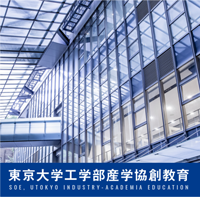Chemistry
Index
Chemistry
Department of Urban Engineering
In the Department of Urban Engineering chemical knowledge can be acquired in order to understand and resolve environmental problems on urban and global scales. Lectures on environmental water quality chemistry, atmospheric environmental science, water environmental science, environmental reaction theory and the like encompass the basic knowledge of chemistry through to an understanding of environmental issues. In addition, lectures such as global environmental engineering, water quality control engineering, water supply and sewer systems and the like cover chemistry applied to environmental technology and social systems designed with chemistry knowledge.
In the third year of the Urban Environmental Engineering course, environmental analysis, environmental investigations, various water treatment experiments are conducted twice a week during environmental engineering laboratory exercises, and expertise for playing an active role as engineers and public servants involved in environmental problems can be acquired. Research for graduation and research at the graduate level range extensively as well, from grasping actual domestic and foreign environmental pollution conditions based on chemical analysis, health and ecosystem risk assessment, and the basic study of chemistry applied to purification technology through to its application in the field.
Department of Electrical and Electronics Engineering
Materials is the key to improving device functionality, and manufacturing that most takes advantage of chemical knowledge is a source of competitiveness. Blue-light-emitting diodes were first put to practical use with the development of GaN crystal growth technology. The Department of Electrical and Electronics Engineering aims to realize revolutionary devices such as solar cells, LED, ultrafast and low power consumption information processing circuits, spin-electronic devices that redesign the concept of information archiving and the like, and conducts research on the manufacture of and evaluation technology for high-grade materials. Students thoroughly study the fundamentals of solid physics and subsequently acquire material manufacturing techniques based on chemical principles. The Material-Device Laboratory and shared use clean room in the Department of Electrical and Electronics Engineering are equipped with the most advanced crystal growth equipment in the world. The array of device manufacturing and evaluation equipment is said to be the highest class, complete university research facility in the world. Utilizing such an environment and the ability to consistently perform, from developing materials to manufacturing devices, is an asset exclusive to the Department of Electrical and Electronics Engineering.
World-leading research on organic semiconductor devices is also being conducted in this department. We welcome you to use this globally rare exclusively organic semiconductor device clean room, to realize flexible devices that can be applied to living organisms and medical care.
Department of Mathematical Engineering and Information Physics
Pursue ‘universal principles and methodology’! These are the basis of science and technology. This is the goal of the Department of Mathematical Engineering and Information Physics. Researching this ‘universal principles and methodology’ is indivisible from research in individual fields, and in the Department of Mathematical Engineering and Information Physics research in various fields is conducted along with researching the ‘universal principles and methodology’.
Examples related to “chemistry” include the development of methods for predicting compound functions from their shapes, system modeling technology development for chemical plants and the like, the development of generic technology such as “chemistry integrated circuit” (chemistry IC chip) and the like. In the department curriculum, students acquire ‘universal principles and methodology’ basics in lectures, develop principles and methodologies through research for graduation, and engage in resolving practical issues.
Department of Materials Engineering
Biomaterials that protect our lives and health, such as artificial organs that replace the lost function of a body part and artificial viruses carrying medicines only to the affected area without causing side effects are studied in this course. In order to create new biomaterials, in addition to a studying basic knowledge of various material sciences and physical property evaluation methods, as exemplified by biointerface engineering we can branch out into biochemistry and other various realms.
The field of materials engineering, in which all materials used in material civilization are the subject of research, is the foundation of all engineering. Our aim is to foster talented individuals who from a broad interdisciplinary stance have the capacity to contribute to the happiness of human society as a whole. In collaboration with the other two courses in the Department of Materials Engineering, the Materials A (Biomaterials) Course conducts education to cultivate extensive insight and we promote cutting-edge research.
Department of Applied Chemistry
In the Department of Applied Chemistry, engineering key words based on chemistry are listed across a variety of fields (the environment, energy, information, nanotechnology, physical properties, biotechnology and the like) in the promotion of fundamental and applied research.
Our keyword is “chemistry”. Following the curriculum that nurtures outstanding researchers and engineers, students acquire fundamental academic skills and advanced expertise by the end of the third year, and develop practical abilities in the fourth year during thesis research. Specifically, research is conducted on photo-functional material development, new energy development, basic nanotechnology development for semiconductor manufacturing, superconducting material development, physical property development for new materials, single molecule biology, microsystem chemistry, catalytic chemistry for environmental preservation, material creation through self-organization, next generation polymer material development, information chemistry and the like.
Department of Chemical System Engineering
In the Department of Chemical System Engineering it is possible to analyze and control chemical phenomena with scales ranging from molecular to global in size, and with a focus on the systemization and design of these components, a chemical system engineering methodology can be acquired.
Based on chemistry, education and research conducted in this department to resolve actual social issues (the environment, energy, safety, security, medical care and the like) on a real time basis. The range of research subjects, from basic chemistry through chemistry used in the real world is broad. From various perspectives, the department is working on resolving issues such as a basic understanding of chemical reactions (the generation of environmental pollutants, combustion reactions, catalytic reactions and the like), the development of and device manufacture for new high-tech materials (catalysts, batteries, advanced nanomaterials and the like), the development of chemical product manufacturing support systems that fully incorporate information science, and the circulation of chemical products in society and the like.
Department of Chemistry and Biotechnology
The key to chemistry in the Department of Chemistry and Biotechnology is "organic chemistry". Sharing “organic molecule” as a common keyword the department conducts full-scale education and research related to chemistry on the science of "molecules", organic chemistry, functional molecular chemistry, polymer chemistry and the like.
Students can learn specialized subjects such as organic chemistry levels I through IV, polymer chemistry levels I and II, molecular assembly chemistry and the like directly from Department of Chemistry and Biotechnology faculty members. In addition, by applying the knowledge acquired through organic chemistry experiments and exercises the education provided by the department is highly practical. This is the only department that teaches a broad range of fundamentals and specialties in both the bioscience and chemistry.
This department is not only active in the fields of medical care and drug discovery, but also aims to contribute to a sustainable society by creating new functional organic molecules that are expected to be used in advanced materials in fields related to the environment and energy.



